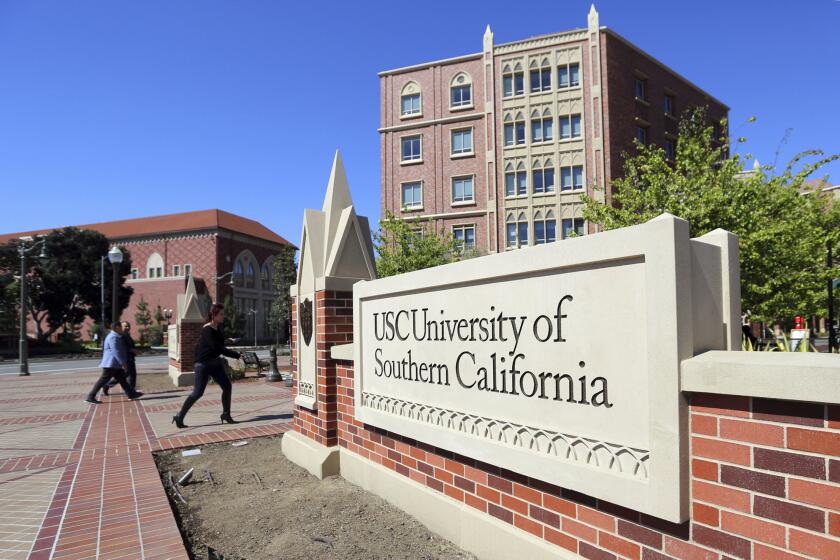Admissions scandal: Newport Beach socialite sentenced to five weeks in prison
- Share via
A Newport Beach socialite who admitted paying $9,000 for a conspirator to take her son’s online courses at Georgetown University was sentenced Wednesday to five weeks in prison.
Karen Littlefair, who has hosted fundraisers for high-profile Republican politicians at her Lido Isle home, was also ordered by U.S. District Judge Allison D. Burroughs in Boston to pay a $209,000 fine and serve 300 hours of community service.
Littlefair, 57, became the 18th parent sentenced and the 16th sent to prison for conspiring with William “Rick” Singer, a Newport Beach college admissions consultant who for a decade rigged standardized tests and bribed college coaches, then helped federal agents unravel the scheme and ensnare his co-conspirators in a bid to reduce his eventual prison sentence.
Singer, who pleaded guilty to four felonies last March, has yet to be sentenced. The case’s highest-wattage defendants — actress Lori Loughlin and her fashion designer husband, Mossimo Giannulli — pleaded guilty in May to conspiring to commit fraud and agreed to spend two and five months, respectively, in federal prison. They will be sentenced on Aug. 21 by U.S. District Judge Nathaniel M. Gorton, who is not bound by the proposed punishments in the couple’s plea deals and can impose any sentence he sees fit.
Littlefair, who was charged months after the celebrity couple and most other parents embroiled in the scandal, maintained a much lower profile. She pleaded guilty to a single wire fraud charge and admitted to a narrow set of facts, drawn up in negotiations between her lawyers and the U.S. attorney’s office in Boston.
In 2017, after Georgetown placed Littlefair’s son on academic probation, Littlefair and Singer agreed to have his employees take her son’s online courses for him, Eric S. Rosen, an assistant U.S. attorney, wrote in a sentencing memo.
In exchange for $9,000, Singer’s employees completed four courses in Littlefair’s son’s name. When Singer billed her $3,000 for one of the classes, Littlefair requested a discount, saying, “The grade was a C and the experience was a nightmare.”
Singer didn’t budge. It “was a nightmare for all,” he wrote back.
Diane Blake and Todd Blake will plead guilty before a judge at a future date, the U.S. attorney’s office says. The California couple had initially pleaded not guilty.
Littlefair’s lawyer, Kenneth B. Julian, asked Burroughs to spare his client prison and punish her instead with probation. Her son has resigned from his “ideal job” at the U.S. Treasury Department, his Georgetown degree has been revoked, and the Littlefair family has been publicly humiliated, Julian wrote in a sentencing memo.
“The curse of carrying around a felony conviction is a significant punishment and deterrent that promotes respect for the law,” he said.
Government lawyers had sought a four-month sentence for Littlefair, arguing she took part in several frauds, not just the one that involved a third party taking her son’s online classes. While Littlefair admitted only to this scheme in her plea agreement, Rosen said the government has evidence that Mark Riddell, Singer’s Harvard-educated accomplice, used a fake ID to take the ACT exam for Littlefair’s son in 2011, lifting the young man’s score by eight points.
Julian said there is “zero evidence” that Littlefair knew of or took part in the cheating. He noted the government chose not to charge Littlefair with the offense, yet raised it to argue for a longer sentence. “It should not be the tail that wags the dog,” he wrote.
Yet Littlefair’s uncharged crimes weren’t limited to cheating on the ACT, Rosen wrote. Littlefair made a $200,000 donation to the Georgetown tennis team, which investigators believe was made “in exchange for having the tennis coach, Gordon Ernst, give up an athletic recruitment spot,” he said.
Ernst is accused of slipping about a dozen children of Singer’s clients into Georgetown by designating them as tennis recruits in exchange for six-figure bribes. He has pleaded not guilty to conspiring to commit racketeering, fraud and bribery.
Although Ernst didn’t formally designate Littlefair’s son as a tennis recruit, the boy’s application described him, falsely, as an elite tennis player who played six hours a week and was highly ranked at the local and regional level, Rosen said.
Julian, Littlefair’s lawyer, said she didn’t know her son was being admitted to Georgetown through the tennis program, and Singer told her he was merely “friends” with Ernst. He submitted her son’s application to Georgetown without Littlefair reviewing it, Julian added.
In an essay included in that application, which prosecutors filed in court, Littlefair’s son wrote, “My parents did not become so overzealous like so many other parents because they knew tennis was a vehicle to learn how to compete and a healthy lifetime activity.”
More to Read
Sign up for Essential California
The most important California stories and recommendations in your inbox every morning.
You may occasionally receive promotional content from the Los Angeles Times.














